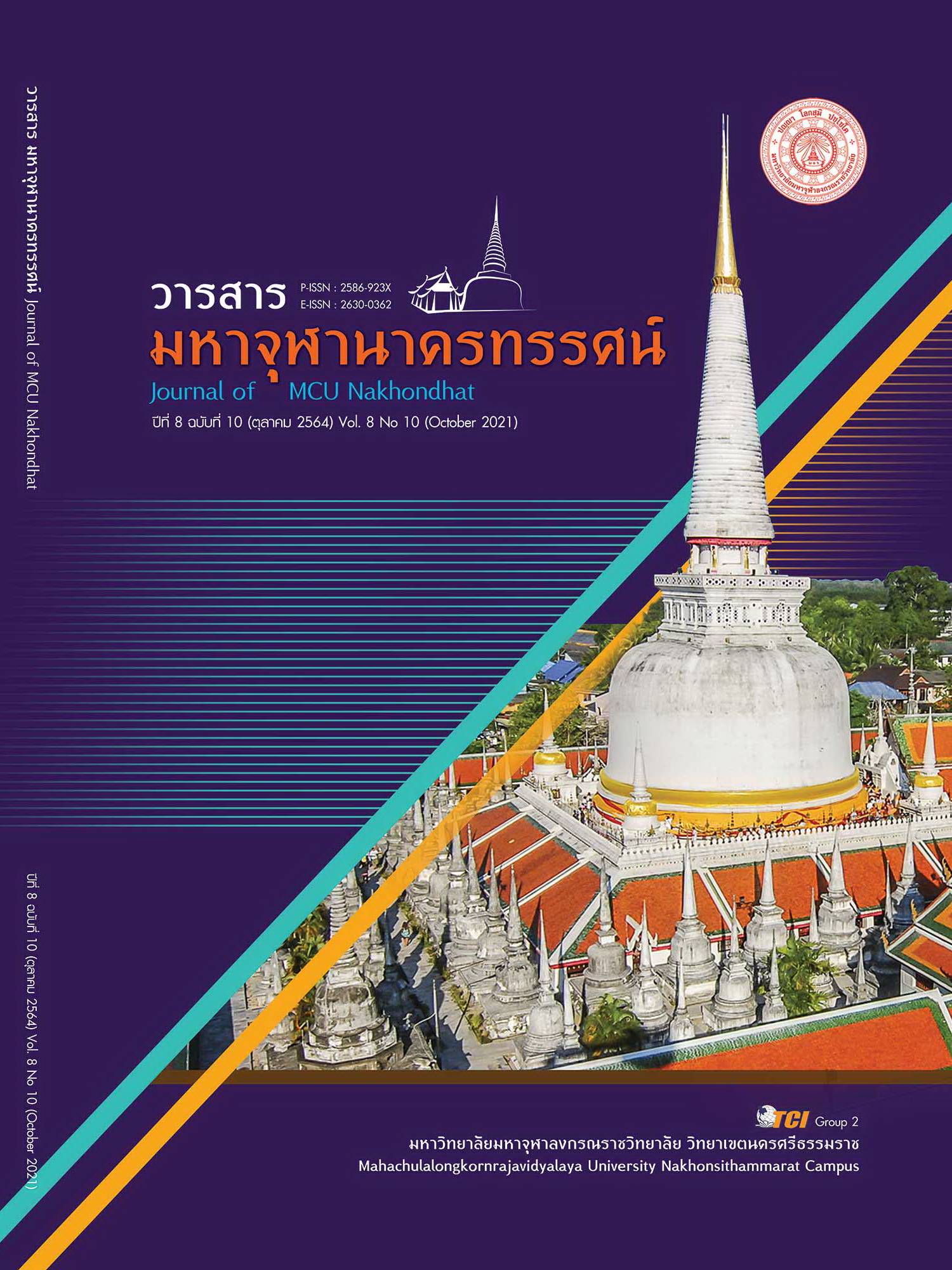DEVELOPMENT OF COMPUTER GAME ON TRANSLITERATION WITH COOPERATIVE LEARNING USING MATH LEAGUE TECHNIQUE FOR TEACHER STUDENTS FROM RAMBHAI BARNI RAJABHAT UNIVERSITY
Main Article Content
Abstract
The objectives of the research article were: 1) to create and find the efficiency of computer game on transliteration, 2) to compare learning achievement both before and after learning with the computer game on transliteration with cooperative learning using math league technique, 3) to study students’ satisfaction towards the computer game on transliteration, and 4) to study learning retention of the students who learned with the computer game on transliteration. This study was in a form of research and development consisted of four stages including: 1. basic information study by analysis data from documents, 2. innovation design, creation and assessment by ADDIE MODEL innovative design and development, 3. innovation trial implementation used achievement test was pretest and posttest, and 4. innovation assessment and improvement used satisfaction assessment. The sample used in this research was a group of 32 undergraduate students from Bachelor of Education Program in Computer Education, Faculty of Education, Rambhai Barni Rajabhat University gaining from simple random sampling. The data analyzed using average, statistics standard, deviation, t-test and content analysis to overview summary. The results found that: 1) the computer game on transliteration had efficiency according to the criteria with 80.94/80.70, 2) post-learning achievement (with mean of 33.88 and standard deviation of 2.96) was higher than pre-leaning (with mean of 28.88 and standard deviation of 3.35) with statistical significance at the .05 level, 3) the students’ satisfaction towards the computer game on transliteration with cooperative learning using math league technique as a whole was at the high level (with mean of 4.19 and standard deviation of 0.71), and 4) learning retention level of the students who learned with the computer game on transliteration with cooperative learning using math league technique for two weeks (follow-up period) showed that there was no difference from after learning with statistical significance at the .05 level.
Article Details
References
กิตติพงศ์ ม่วงแก้ว. (2562). การพัฒนาเกมเพื่อการศึกษารายวิชาคอมพิวเตอร์ เรื่อง โครงงานคอมพิวเตอร์สำหรับนักเรียนชั้นมัธยมศึกษาปีที่ 6 โรงเรียนยางตลาดวิทยาคาร. วารสารเทคโนโลยีและสื่อสารการศึกษา คณะศึกษาศาสตร์ มหาวิทยาลัยมหาสารคาม, 2(4), 108-119.
ชัยยงค์ พรหมวงศ์. (2556). การทดสอบประสิทธิภาพสื่อหรือชุดการสอน. วารสารศิลปากรศึกษาศาสตร์วิจัย, 5(1), 7-20.
ทิพย์สุคนธ์ พันธ์กิ่งและคณะ. (2558). การพัฒนาบทเรียนอิเล็กทรอนิกส์โดยใช้เกมคอมพิวเตอร์เป็นฐาน เรื่อง การเขียนผังงาน. วารสารครุศาสตร์อุตสาหกรรม, 14(3), 244-251.
ทิศนา แขมมณี. (2554). ศาสตร์การสอน องค์ความรู้เพื่อการจัดกระบวนการเรียนรู้ที่มีประสิทธิภาพ. กรุงเทพมหานคร: จุฬาลงกรณ์มหาวิทยาลัย.
ธนกฤต โพธิ์ขี. (2555). ผลการใช้เกมมัลติมีเดียเพื่อพัฒนาการจำและความคงทนในการจำคำศัพท์ภาษาอังกฤษของนักเรียนระดับชั้นประถมศึกษาปีที่ 6 โรงเรียนวัดชินวราราม (เจริญผลวิทยาเวศม์). ใน วิทยานิพนธ์ศึกษาศาตรมหาบัณฑิต สาขาวิชาเทคโนโลยีและสื่อสารการศึกษา. มหาวิทยาลัยเทคโนโลยีราชมงคลธัญบุรี.
ธิษณะ จงเจษฎ์ และสายัณห์ โสธะโร. (2561). การสอนซ่อมเสริมโดยใช้เกมคอมพิวเตอร์เพื่อการศึกษา เรื่อง การดำเนินการของจำนวนเต็ม สำหรับนักเรียนชั้นมัธยมศึกษาปีที่ 1. วารสารครุศาสตร์อุตสาหกรรม, 17(2), 101-108.
บุญชม ศรีสะอาด. (2556). วิธีการทางสถิติสำหรับการวิจัย เล่ม 1. (พิมพ์ครั้งที่ 5). กรุงเทพมหานคร: สุวีริยาการพิมพ์.
ปัญณธร เพ็งยอด และกอบสุข คงมนัส. (2563). เกมคอมพิวเตอร์ที่ส่งเสริมความสามารถการสร้างสื่อมัลติมีเดียด้วยโปรแกรม Scratch. วารสารมนุษยศาสตร์และสังคมศาสตร์ บัณฑิตวิทยาลัยมหาวิทยาลัยราชภัฏพิบูลสงคราม, 14(1), 15-30.
รัตนะ บัวสนธ์. (2563). การวิจัยและพัฒนานวัตกรรมการศึกษา. (พิมพ์ครั้งที่ 2). กรุงเทพมหานคร: สำนักพิมพ์แห่งจุฬาลงณ์มหาวิทยาลัย.
ราชกิจจานุเบกษา. (2563). ประกาศคณะกรรมการคุรุสภาเรื่อง รายละเอียดของมาตรฐานความรู้และประสบการณ์วิชาชีพครูตามข้อบังคับคุรุสภา ว่าด้วยมาตรฐานวิชาชีพ (ฉบับที่ 4) พ.ศ. 2562. เล่ม 137 ตอนพิเศษ 109 ง หน้า 10. วันที่ 7 พฤษภาคม 2563.
วัฒนพล ชุมเพชร. (2563). การพัฒนาระบบเกมการศึกษาเพื่อส่งเสริมการเรียนรู้ในห้องเรียน. วารสารเทคโนโลยีภาคใต้, 13(2), 104-115.
วิสุทธิ์ คงกัลป์. (2558). Math League: เทคนิคการสอนรูปแบบใหม่ที่ช่วยกระตุ้นการเรียนรู้ของเรียนได้เป็นอย่างดี. กรุงเทพมหานคร: สำนักพิมพ์แห่งจุฬาลงณ์มหาวิทยาลัย.
ศรัณย์ลิตา โชติรัตน์. (2562). การจัดการเรียนการสอนแบบผสมผสานและการบูรณาการเกมมิฟิเคชันกระตุ้นการเรียนรู้ในรายวิชาโครงสร้างข้อมูลและอัลกอริทึม. วารสารวิทยบริการมหาวิทยาลัย สงขลานครินทร์, 30(2), 69-79.
อนวัช คงประเสริฐ และคณะ. (2561). การเพิ่มทักษะการแก้ปัญหาทางคณิตศาสตร์ด้วยเกมคอมพิวเตอร์โมเดลแอบแตรกโคดของนักเรียนมัธยมศึกษาตอนต้น. วารสารวิชาการแพรวากาฬสินธุ์, 5(3), 529-545.
อลงกรณ์ พลอยแก้ว. (2564). คำทับศัพท์และคำศัพท์บัญญัติ. เรียกใช้เมื่อ 1 พฤษภาคม 2564 จาก https://www. trueplookpanya.com/lite/knowledge/view/34243
Cronbach, L. J. (1990). Essentials of psychological testing (5th ed.). New York: Harper Collins. Publishers.
Likert, R. (1967). The Method of Constructing and Attitude Scale Reading in Fishbeic M (Ed.) Attitude Theory and Measurement. New York: Wiley & Son.
McGriff, Steven J. (2000). Instructional System Design (ISD): Using the ADDIE Model. In Instructional Systems, College of Education. Penn State University.


